From Kreshnik KUCAJ
Memorie.al / Gjergj Bubani, is a well-known journalist of the 20s-30s in Albania. After a heavy publishing activity in Romania, he returned to Albania in the 1930s, becoming active in the press of Tirana and holding the position of the first director of Radio – Tirana. In his writings, he works extensively in the field of satire. He was born in 1899, in Boboshtica, Korça, and passed away in 1954. In 1915, he studied in Athens, at the Academy of Trade Industry, and then emigrated to Romania, where he became active in the Albanian press. there, maintaining a strong nationalist line.
There he wrote under the pseudonym; “Guri Malësori” and “Malesori”. In the years 1924-1927, he was editor-in-chief and political director of the newspaper “Shqipëri e re” and a correspondent in the Albanian press. In 1938, when Radio-Tirana was established, he was appointed its first director. When Albania was being invaded by Italian fascist forces, he appeared on the microphone and in foreign languages, calling on the Great Powers to intervene and stop the invasion. After the invasion, he resigns and asked to go to Romania, to his family, but it is not allowed. During the German occupation, he was arrested together with the staff of Radio – Tirana and sent to the area of the River Bank in Tirana, for shooting, but he would be saved as a result of a quick intervention, which brought about the cancellation of the order.
After the war, he was arrested by the communists and sentenced to 15 years in prison, of which he suffered only 6 years and after he was released from prison in 1950, he suffered a serious health condition, which ultimately led to his death in 1954. Apart from many reportages, interviews, essays and problematic writings for the most diverse fields of outstanding importance for the development of the country, such as; economy, educational reform, agrarian reform, culture, etc.
Bubani had a dense creativity in the field of satire, where he wrote under the pseudonym “Brumbulli”. Below is a cycle of reports published in the newspaper “Drita”, in December 1936 in Tirana, where he writes under the pseudonym “Brumbulli” and calls him; “banal reportage”, with a subtle sense of irony, where it touches on strong social and economic themes. His writings have been summarized in a cycle of volumes published by ‘OMSCA’, under the supervision of Loredan Buban.
Travel notes, Tirana-Shkodër
Travel notes….banal reportage…!
The whole world has made the Tirana-Shkodër journey. Let the road itself be my witness, which has become fruit-fruits (bubbles, potholes), from the great rubbing of automobiles. However, it could be in a slightly better condition, especially since the roads have been in Shkodran until yesterday. Banal reporting, so don’t expect great things. We will touch on some aspects here and there, and nothing more. A fairy tale. I would leave in the morning. The newspaper also wrote it. And a job written by a newspaper can only be as it was written. But you will tell me: “the newspapers also wrote about others, that they were going to America, but they didn’t.”
Tell your lady like that, that you don’t know the problems of the world. Or, rather, you don’t know the tale of him…who caught a thief on the mountain. Do you want to hear it? There were two brothers and they wrote on the mountain for wood. There they parted. One took it from here and there, the other from there. When they were comfortably cutting wood, one of the eyes, the youngest I remember, appeared in front of a thief. This one, to scare him, calls out to his brother: – “O Nabul, o”! – “What is it, Leko?” Nabuli answers, from the top of the next hill. – “Come, come, I caught a thief”! – “You got it, huh? Good! “Bring it here, in the dark”! – “But he doesn’t want to come”! – “Then leave it! Let it go, if it doesn’t want to come”! And poor Leko, talkative, answers! – “I’m leaving him, but he’s not leaving me…”! …They say, well, that the thief of the tale was, this time, a usurer. Goodbye, America!
I am happy with Shkodra
As for me, I haven’t caught any thieves, because I’ve barely started writing. So, then, I can move freely, wherever I like. What is right, in America I have no intention of my own. As you know, even Mr. America, now, takes and does not give. They wrote those blessed times, when Albanian journalists collected dollar bills in America. At that time, God had come down to earth and dogs were roaming the streets with pretzels hanging from their tails, in America. Today, there are only homeless people and Albanians who cannot find a place to return home. And I don’t have money to pay the fare. Therefore, not only in America. I am happy with Shkodra.
A steamer and a servant
We’re talking too much. We are doing the reportage in Turkey, like the famous “J’accuze”, which started years ago and is still not over. Now let us put aside the troubles of the world and come to our troubles. I would leave in the morning. I shaved, combed, peed and took the office servant to find me a car, or in Albanian, a seat in the car, because we didn’t have enough. Do you know my servant? He is the one who distributes the newspaper (when he feels like it) to the subscribers of Tirana, by bicycle. He’s resourceful, you know, he gets all the work done….halfway. We inherited it, together with a steamer, from a former sister. That’s why our director keeps it as a talisman, although I would be willing to board a steamer one day and give it a ride to…Erzen.
A poor servant and a poor driver
I told:
– “Listen here my son (the expression was lent to me by Mr. Lumo Skëndo). Go find me a seat in a car, in the first car, that leaves for Shkodër. But keep your eyes open, because drivers have a habit of lying. They say they will go now and leave tomorrow morning. Do you understand, my son? After two minutes – since I told you that he is a spuzak and has a bicycle – “my son” was back in the office. He could hardly breathe. – “I found it. It starts on the 11th exactly. And I told him that you will wait for him in ‘Kursal'”.
– “More, did you speak well?” Did you explain? You told him that I must leave because … the newspaper also took it”? – “As you order”! And on 11 after 10, I got stuck in “Kursal”. And I was stuck for beauty, because I sat there, waiting, until 2 in the afternoon. Bereqaversen, who came to me, my charming friend and highly valued artist and sculpture professor Mr. Kole Shala, because otherwise I would be furious.
Albanian is not English
When I see that it is getting dark and there is no car, I wait for the teacher to speak. – “Take a cough, take a breath. It’s two o’clock and that devil is not coming”! – “What did you blame the Albanians for?” English”? – “No, dear, no one says they are English (there they are, they leave a pretty crown for a piece of love), but I have to leave for Shkodër, otherwise the director will listen to me… Goodbye, maestro”. And I came out. I went out to look for the car, but I only found… the driver. – “Yes Yes. Someone talked to me. But later they told me that you went with the Post Office and I just started the car…”! Another one, who was standing behind him, gestured to me: “You’re lying!”
I was convinced. But I had no time for words. Next I see some kind of car, which was neither a van nor a bus. Something between the two, let’s call it a sub-bus (like the deputy minister), I only saw that it was old, rickety, there were four or five people inside and a driver outside, unguarded, but very charming. – “Where”? – “For Shkodër”. – “And when did it start”? – “Together”. After five minutes, in the vibrations of the subbus, I was flying to Shkodër.
“Goodbye, Tirana!
Tiranë Shkodër-
Goodbye, Tirana!
Goodbye, Tirana”!
(I don’t write “goodbye” anymore, because the proofreader makes me double d and I have a voice). The minibus, like a 50-year-old woman from Nazareth, goes swaying on the road of Durrës. It runs as fast as it can, but when we got out of Tirana, it starts to jump, like a goat, which proves that it used to be a “Chevrolet” brand. Today it is a jumble of boards, tins and broken glass, and moving in different directions, diametrically opposed to each other, producing a strange sensation and an infernal noise.
But the engine looks quite healthy, the brakes disciplined and the driver’s hand dynamic and dictatorial and, to tell you the truth, I am more interested in these than the external appearance. Two devils, sitting on the second bench, talk to each other. I can’t hear them, but neither have they heard each other yet. They have been talking for 20 minutes and I understand from the tone of their voices that they have not understood each other.
“Maxusie”
The car turned to the right. We take the road to Shkodra. The driver wants to tell me something. He spoke some 3-4 phrases, but I only caught one word, from which I extracted a meaning. He knew that I was from Jabanji and had to tell me that the place where the Shkodra road separates from the Durres road was called Pig…! – “What did you say”?! – “Pigza”. The more we drive, the more charming the driver and the less evil the car seems to me. Yes, yes, I can say that it goes very fast; He overtook two cars, much more pretentious in appearance, and although there is no odometer, I am now sure that we are going 35 kilometers per hour! So I decided to change his name. I don’t want to tell him anymore, neither the subbus nor the car. I will find a more noble and resonant name. And I baptized him “Maxusie”.
Istanbul Express
“Maxusie” that is, from now on. And the name is hit point. This name was found like that, talk and laugh, but it has its own meaning and its own history. And, since, in the banal reportage of this trip, other stories have entered, let’s tell this: Forty or fifty years ago – I don’t remember well – the Turks also decided to buy a steamer of their own. Until then, only foreign ships, French, English, Italian and others, used to call in Istanbul. There was no Turkish steamer.
The Turks also bought an old steamer, which they used for the Istanbul-Izmir line. Once a week, this steamer departs from Istanbul and after three days, it arrives safely in Izmir. Foreign steamships made this trip in just one day. But this did not prevent the Turks from bragging about their steamboat and going out, once a week, to the edge of the sea, waiting with special honors, when he returned from the trip in good health. And do you know how they got the name of this steamer? “Maksusie”, which means “express” in European terms!
The value of “Maxusie”
So you saw it? With one story, with one issue, we shortened so much! At the end, like following giants, the mountains of Mati and Kruja are drawn. One after another, picturesque landscapes succeed. The whole of Albania is beautiful, but the Shkodra road has something of its own, something special that fascinates you. The landscapes change frequently, they don’t tire you, and the shades of color are easier to find in fantasy paintings than in nature chips. And Kruja, scattered and stuck there, stands in the middle of the mountain. Rare beauty.
I’m barely now finding out why ours, as soon as a foreign visitor arrives, they quickly take him to Kruja. That is, it was not only for the incomparable feasts, which are brought to the foreigners in Teqe e Kruja, under the shade of centuries-old oaks, by welcoming Fathers and Dervishes, feasts with worldwide fame, from the day that passed there and the late ex- head of the International Labor Office, Albert Thomas, who, for months, continued to tell diplomats in Geneva that there is no soup in the world like the soup he ate in Kruja!
So it’s not just the feasts and the historical value of the legendary castle, the reasons for these visits, but also the beauty of the landscapes! And, how much, this beauty is increased by changing the pictures. February: Who has not done this route, should do it, but choose a beautiful sunny day. One more tip: Do not drive by car for those who are in a hurry, because it is a sin not to enjoy these landscapes as much as possible. With “Maxusie”, yes, with my “Maxusie”, which, now that I have found its value, I will not even exchange it for Mr. Fortuzi.
“Maxusia” runs at full speed and the road is always shortened. Farther right, top of a hill, a beautiful cluster of houses. At the bottom, massive mountains. A woman, a young bride, with a baby in her arm and an ax in the other arm crosses (crosses) the causeway. Dressed in national clothes and with an uncovered face, beautiful, white, red and full of health, he goes for wood in the forest. This must be the real Albanian, the Albanian from whom this nation expects its regeneration.
Neither in appearance, nor in dress, nor in gait, this sorkadhe has nothing in common with the women of our cities, and especially with those we meet in Tirana, Shkodër, Elbasan and elsewhere, dressed as gojhomelas, to frighten the galas. The highlands are not covered, never have been. Covering women is a foreign custom. The Turks brought it to us. Today, the Turks left this custom, but we continue to keep it. And we will keep it for a long time, because it has been proven that we are stubborn in our rear.
Only I get covered
But, as we started, the reportage is becoming really banal. Let’s give it a little joke color. We have the word on the covering of women. Many years ago, a liberal friend of mine was married against his will to the woman his parents chose. You might not be so ugly, poor thing, but you couldn’t fill your friend’s eyes. A few days after the marriage, the woman who had grown up with the customs of the Albanian cities, locked in a cage and covered with a sheet, asks her husband, who should be revealed to and who not. And he – a spuzak grown up in the salons of Europe – one by one, says to him: – “To the whole world you come out uncovered, only I come out covered”!
“Maxusia” and kolkokosdrumi
We stayed. What is likely? Nobody knows, not even “Maksusisi”, but the road is occupied by a big truck, the size of a railway wagon, which is stuck in the middle of the road because it ran out of gas. It is 10 kilometers to the nearest gas station. The resourceful driver has sent the helper on foot, with a can and waits until the gas arrives. The helper has an hour that has started and if he doesn’t find a car and is forced to leave and come on foot, he can return after 3 hours. I had the chance to be proud, when I saw that our little “Maxusia” took out two liters of white blood from her belly, to lend it to the kolkosdrum-truck.
The truck moved from the place and “Maxusia” flew again. From the left side a fairy tale landscape. A mosque and a clock can be seen at the top of the hill. – “Preza”! – the driver explains to me. And when we passed near Preza, on the right side of the road, I saw the helper with the can in his hand. He gestured for us to take that as well. But we showed him at the end of the road his truck, which had started and was falling behind us. “It’s a shame that I gave him gas”, – I shout in the driver’s ear. “No, damn it! Sin”! “Wrong done, usta! We would rather tie the kolkokosdrum behind ‘Maxusia’ and pull it, just like that, to make it ugly. I would take you out in the frame and we would put it in the newspaper. It would be an advertisement for ‘Maxusie'”.
Exhausted tire
We arrived at the Black Bridge. We stayed. Here another battery. A passenger bus – which also transports the mail – was left behind because its tires were punctured. There is no spare and the desolate driver, together with the helper, are trying to patch a worn tire. Passengers fight. Some want to come with “Maxusie”, but they have paid for the transport and the driver has no money to pay them back.
We only get one captain – the old man, there and here – and goodbye to Mrs. Post, who left Tirana, 2-3 hours before us. If you wanted gas, we would give it to you, but we have the tires for ourselves. We leave the road to Krujë on the right, pass by the famous Teqe and fly forward. – “Please Mr. capter, a little further the rifle, that I heard him with all the drivers… that he traveled from one village to another 3-4 times a day. We were in his jurisdiction and from what the driver told me later, he was very good at the job.
We broke Ramadan
In no time, we passed the Stinking Water. It began to get dark and we have now entered the strait that forms between the mountain and the river. Here, a beautiful center, new buildings, something like Librazhdi. We pass a few minutes over the strait and, on the other side of the mountain, the magnificent bridge, “Zog I-rë” appears in front of us. We cross it and I feel like we are crossing some Tirana boulevard. The river has drowned an entire field, but it doesn’t look good, because it drowned. Across the bridge, we meet 3-4 women. Loaded with wood, they are returning from the mountain to the village. Rustic appearance, but badly ugly; it brutally shows our weakness. – “What time is it?” – asks the driver. -“Five to five”, – I answer.
– “The ball will have dropped, then.” – “Oh of course. It’s too late”! The driver puts his hand in his pocket and gives us all an apple – he had bought in Mamurras – to break Ramadan. The devils wove cigarettes and lit them. And after so many hours of abstinence, they were now inhaling the smoke with a taste that we will never know. The most intelligent commandments of the Muslim religion remain Ramadan and ablution. The second cleanses the body, while the first is a wonderful exercise of the will to abstain, plus diet, cleansing the stomach and strengthening the appetite. But this is where we arrived in Lesh. Here the restaurant awaits us, with all the goodies.
Ramadan night
Late at night, we arrived in Shkodër and stayed in the “Park” hotel. With longing, I parted from my beloved “Maxusia”. I headed to the hotel and the driver went to shave. Ramadan night. Plenty of windows and movement, in that small piece that forms the center of Shkodra. Who doesn’t know Shkodra and falls suddenly, one time, to who knows what famous European city. Yes, I have known Shkodra another time, with all its qualities and shortcomings. However, the celebratory wear it has taken on, I am attracted to and I like it.
Drums and bells
Another time, at 8 o’clock in the evening, life stopped in the center of Shkodra. The people of Shkodran – famous conservatives – are removed from their homes and, in the 2-3 best cafes of the center, you will rarely see any group of late customers. But tonight it changes. It is the last nights of Ramadan and during Ramadan, the movement in the center of Shkodra continues until close to midnight. In religious work, Shkodra holds the record in Albania.
I don’t want to go deeper into this conversation, because it is very delicate. And I wouldn’t have taken it at all, if you hadn’t touched me directly, calmness and sleep. Especially sleep. I couldn’t sleep all night. That when the drums of Ramadan stopped, the bells started. And unintentionally, I noticed that Shkodra has both loud drums and big bells.
Hotel “Park”
Shkodra has a hotel that no other city in Albania has. Beautiful, modern building, large rooms, running water, bathroom, good furniture. Only one thing is missing, to be called a finished hotel; the heater. Even the “Park” hotel is heated according to the “International” system: two studs in the corridor and the doors of the rooms open. Finally the problem is solved with a hot coal tagar. And the tagari is not only dangerous, but spoils the whole beauty of the hotel.
Downstairs, the hotel’s cafe, divided into two parts, appears as a finished bar. At the end, the restaurant with 6 customers and an internationally famous waiter, Pjetrin. Peter and not melon. Pjetri, the waiter of the “Park” restaurant, has, as we said, international fame. But he is very angry with journalists. That another journalist who passed there a few months ago, I baptized him; “melon”! And since then, Melon calls all 6 regular customers of the restaurant. The lonely Peter is saddened but does not show it, so as not to spoil the joy of the world.
And in order to quench his anger, he sometimes stops behind the entrance screen and drowns his sorrow with a glass of lively and strong grape water. When the fiftieth of regular tahini is empty, the waiter’s face changes. You can call it melon and laknor now, if you want. He doesn’t get angry anymore. He likes to talk and, if you get the best of him, he knows how to predict your fate by looking at the bottom of the coffee cup.
Two systems
Among the 6 regular guests – excuse me 7, because I am also now – there is also a professor of the Gymnasium, a young and charming guy, with sound culture. A few months ago, he came from America, where he received his doctorate in natural sciences. Peter explains in my ear: “Good teacher, but he has two faults: When he eats yogurt or pilaf, he dries our sugar and at school, when he finishes the lesson, he says to the students; Thank you! And the students gasped. That they are not used to beautiful words”.
– “But what do you say, Peter? Does it do good or bad? – “By God, I have told him that he is doing wrong, but he does not listen to me. Don, he says, wants to make students friends and comrades. That’s what the pedagogic system, which has learned in America, begs for! Wrong system, sir, and chiefly at odds with our systems. I know these systems of ours because I was a student in the capital’s high school for a year…”! Peter knows how to joke.
Something must be done for Shkodra
Shkodra’s bazaar is in flagrant opposition to the urbanization of the center. Small, crooked shops, shopkeepers with frowning faces because of the crisis. Shkodra suffers a lot economically. More than any other city of Albania. That the hinterland that is left is very limited. Or rather, Shkodra is too big for him. But the people of Shkodra learned to suffer and don’t fight so much. This proves that they are patriots. However, we should not leave Shkodra in the hands of fate. Something must be done to save this beautiful and old city from decadence.
For industry, Shkodra is ideal. The lake, the rivers, their connection with the sea, are great advantages. Boats and steamers loaded on the edge of Buna can easily communicate with all the Albanian harbors and the outside world. Today, Shkodra has only one marked industry: “Portland Cement”. We hope that in the future, other industries will flourish in that city – woodworking, wool, leather, etc. And so Shkodra will be revived. Shkodra has no traffic, but the highlands have no bread.
But if Shkodra suffers from a lack of traffic, its highlands suffer from a lack of a piece of bread – reeds. Salty bread. Here are summarized all the claims that the dragons of those mountains beg for life. But they can’t have these either. Isolated among barren hilltops, our highlanders want to work but lack land. Here and there a few fields of land, 5-6 short furrows removed with great difficulty through the slopes, barely provide the family with a few bags of corn. Food for 3-4 months. But the year has 8 more months, and the stomach wants every day.
The Government comes – hair paste – with its help, it distributes 2-3 kilos of reeds to the highlanders and thus the problems are covered for another 2-3 months. Then the highlanders go down to the cities, especially in Shkodër, chop wood, earn 1-2 lek a day and buy reeds. But the wood to be split is less than the mountaineers looking for work.
A saving formula
In the cafe of the “Park” hotel, the conversation revolved around the crisis, mountaineers, wood to split, reeds and government orders to stop the descent of katundars into the cities. Mr. M.K., a famous economist, speaks. – “The orders are not bad, but what is the problem, that the inhabitants of our mountains have no bread”? – “Let’s colonize them in the fields”. – “We colonized them in Myzeqe and malaria ate them.” – “Then what do you think, sir?” – “Albania is narrow and long. From its mountains, four rivers flow into the Adriatic. These rivers are rebels, they drown our fields and leave us without bread”.
– “Now then? – Let’s all get together, a million of us, let’s put all other work aside and, within a few years, hit all four channels that appear. Discipline and tame our rivers. If we did this, we saved ourselves from poverty”. – “But can this plan be practically realized”? – “Yes, it is enough to want and decide to use, for this purpose, the powers of the army, the unemployed people and the forced workers. Very large capitals are not needed. We have plenty of arms”. I, who am not very competent in economics and especially about channels, recorded the formula with all reservations. Memorie.al
“Beetle”, December 1936




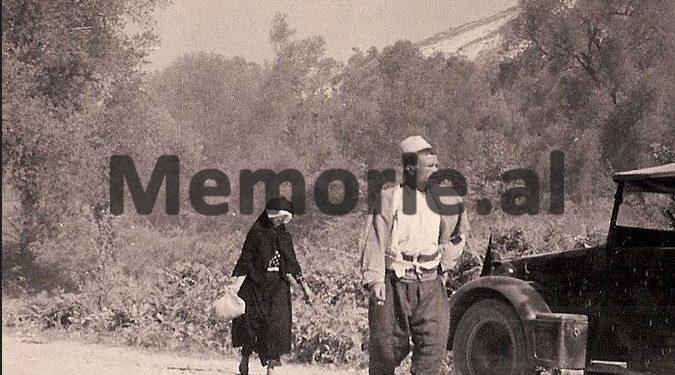
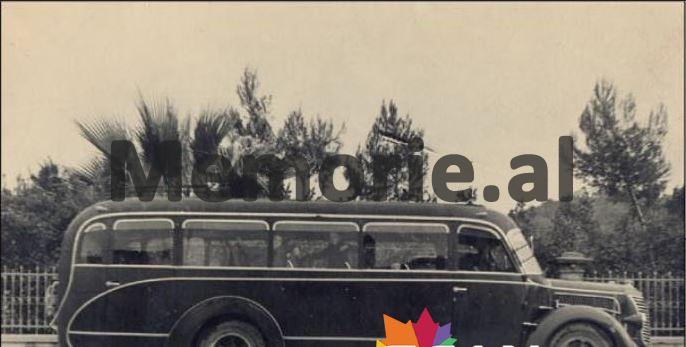
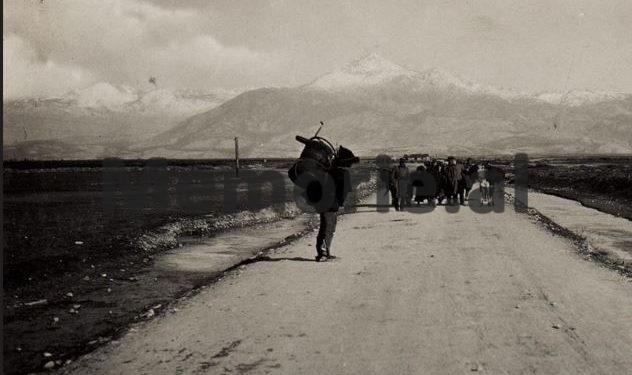
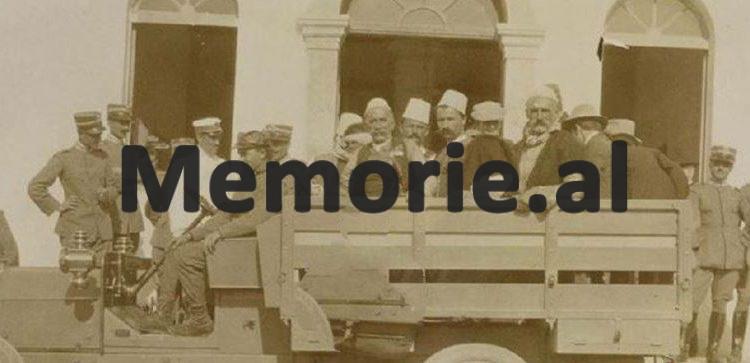



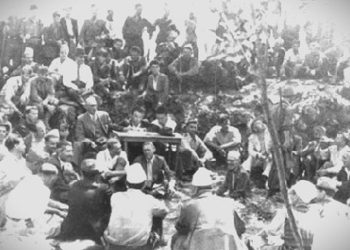
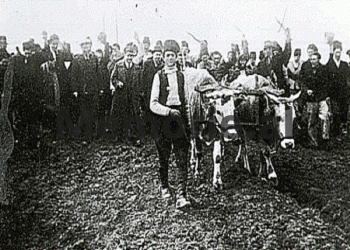
![“They have given her [the permission], but if possible, they should revoke it, as I believe it shouldn’t have been granted. I don’t know what she’s up to now…” / Enver Hoxha’s letter uncovered regarding a martyr’s mother seeking to visit Turkey.](https://memorie.al/wp-content/uploads/2026/01/Dok-1-350x250.jpg)
